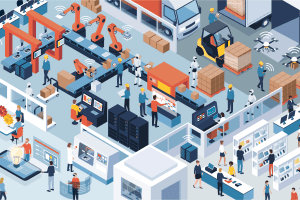MSSPs vs MSPs: How to choose the right IT service provider

Steven Freidkin, Founder and CEO of Ntiva, shares his expertise on the differences between managed service providers (MSPs) and managed security service providers (MSSPs), and what businesses should consider when assessing which type of outsourced IT provider is best suited to their needs.
Many businesses lack the in-house capabilities to maintain complex IT systems and data security compliance standards, and the costs of setting up and running these functions are prohibitively expensive for all but the largest of companies. For most organizations, the simplest and most cost-effective way to manage this is to outsource it to third-party specialists, namely managed service providers (MSPs) or managed security service providers (MSSPs). However, business decision-makers can often confuse business decision-makers as to the differences between an MSP and MSSP, and which is the best choice for their needs. While the definition of an MSP is relatively well understood, it can be a bit confusing as to what (or who) an MSSP actually is and does.
In brief, there are typically “pure play” MSPs and MSSPs, as well as MSPs that offer MSSP services.
Confused? Read on for a quick guide on what to consider when choosing an MSP vs an MSSP.

The all rounder: MSP
With the increasing demand for IT solutions that optimize business processes, companies have increasingly started to outsource their IT services to managed service providers (MSPs). An MSPs primary role is to ensure that all IT systems within a business are well maintained and that help desk staff are available whenever any technical issues arise. Core services typically include monitoring and management of network infrastructure, software applications, and end user devices.
Larger MSPs may offer advanced services such as cloud migration and management, business telephony, application development, virtual CIO and virtual CISO, and more. Some, but not all, of these larger MSPs will also offer advanced cybersecurity services, which means more than just a firewall and perimeter-based protection. It must include preventing, detecting, and responding to threats before they wreak havoc on the business, and this function requires a security operations center, or SOC.
A SOC is a combination of people, processes, and technologies that handle the task of protecting clients’ networks, data centers, servers, databases, applications, websites, endpoints, and other technologies. Typically, the ability to provide SOC and SIEM is what differentiates an MSP from an MSSP.
The security expert: MSSP
An MSSP is essentially an MSP that has stepped up its cybersecurity game.
Much of an MSSP’s focus is on detecting, preventing, and responding to threats, as well as helping businesses achieve and maintain specific data security compliance standards, such as HIPAA, HITRUST, and CMMC.
Gartner defines MSSPs as:
- The delivery of security operation capabilities via shared services from remote security operations centers (SOCs), not through on-site personnel or remote services delivered on a one-to-one basis to a single customer
- The remote 24/7 monitoring of security events and security-related data sources
- The administration and management of IT security technologies
Depending on the businesses’ needs, MSSPs deploy, configure, and manage antivirus software, firewalls, VPN use, threat intelligence, and identity access management. Their IT security system can be implemented across all networks and apps and aims to align security with compliance frameworks.
Until recently, MSSPs were the only security provider working with Security Operations Centres (SOC 1 & 2). SOC ensures the protection of the infrastructure (servers, applications, databases, networks, etc.) and provides round-the-clock security monitoring. If incidents occur, SOC can react quickly by drawing on detailed analysis.
Currently, many MSPs have stepped up to offer the 24/7 SOC functions, helping companies to avoid the enormous task of keeping up with new developments in cyber security.
Which is best for your needs?
Both MSPs and MSSPs can be critical resources for businesses that are struggling to efficiently and effectively manage their IT. However, while both are closely related to IT, there are some technical issues that one type of service will be better equipped for than the other.
Generally speaking, it’s better to hire an MSP if you need general technology services to help make more efficient use of your IT budget, implement a new IT platform, or meet some other goal not related to security or compliance. On the other hand, it’s usually the better option to hire an MSSP if you’re looking to improve your cybersecurity standards and protocols, or need to meet a specific compliance standard.
As stated above, MSPs and MSSPs aren’t always mutually exclusive. Some can provide both kinds of service at the same time—giving you a comprehensive list of IT services under a single, unified strategy that accounts for all your needs, including advanced cybersecurity protection.
In today’s ever-increasing threat landscape, the truth is that almost every business needs the highest level of cybersecurity protection they can afford. When looking for outsourced IT services, it is highly recommended you choose a provider that offers advanced cybersecurity solutions, whether it is an MSP or MSSP.
Moreover, if you need to achieve and maintain specific security standards, such as HIPAA or CMMC, then you should look for a provider that has specific experience and in-depth knowledge of that specific area of compliance.
READ MORE:
- SolarWinds completes spin-off of its MSP business, N-able
- Managing your business’s transition to Apple devices: lessons from an expert MSP
- How Can MSPs Become Trusted Cybersecurity Partners to the SME Community?
- 4 key 2022 security trends predictions
It’s also important to check on smaller details when choosing your service provider. For example, if your company uses Apple devices, you’ll need to ensure that the provider can support this and has the relevant in-house expertise. Don’t make a mistake and put the security and future of your company at risk – do your due diligence and invest in an experienced services provider that offers true “security as a service” to ensure your data is safe, secure and compliant around the clock!
For more news from Top Business Tech, don’t forget to subscribe to our daily bulletin!
